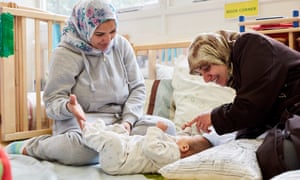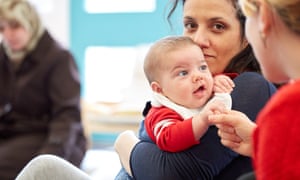In a noisy community hall in London, mothers and toddlers sit in a circle shaking tambourines and singing. At first glance it’s just another infant music session, but looking around, a different picture emerges. Nearby a mother, a sleeping baby in her arms, chats quietly to an attentive volunteer known as a maternity champion, while another cheerfully hands out cups of tea to a couple of exhausted-looking women, that tell-tale sign of new motherhood.
The maternity champions project, run by Paddington Development Trust in partnership with the NCT, the UK’s largest parent charity, launched as a two-year pilot in 2014, funded by Westminster council’s public health team. Funding has recently been extended for a further two years and the aim is to roll out the concept nationally. The pilot is part of a wider programme of NCT peer support projects across the country, to provide support, link parents to antenatal and postnatal services, and reduce the social isolation many new mothers feel.
In London’s Queen’s Park, which crosses the boroughs of Brent and Westminster, where the project takes place, wealth and poverty sit side by side. Despite being in central London, a third of the households in Queen’s Park earn less than £20,000 a year and parts of it fall within the top 10% most deprived in England. The volunteers, recruited from the local estates, have been trained through NCT’s Birth and Beyond community peer supporter scheme and run twice weekly drop-in sessions, open to all mothers in the area.

When Anne Watson, a new mother in her 30s, first came to the drop in, she was sleep-deprived and emotional. Her baby, Oscar, was nearly six months old and having problems sleeping. “I hadn’t slept properly for weeks and I was beyond exhausted,” she says. “I turned up and said I’d like some advice, and promptly burst into tears. He got scooped off me and cuddled, I got taken off and cuddled too. I was given a cup of tea and someone to talk to. It just made me feel not alone to speak to the maternity champion as she had been through it. I got some support and advice. It was just wonderful.”
NCT research has found that 80% of participating parents reported that the project helped them to access local services (including health-visiting services and support groups for new and pregnant parents) and three quarters said they felt more confident about their pregnancy or being a parent.
Sarah McMullen, head of knowledge for the NCT, was involved in the design of the project. She says: “Women often have very specific and personal needs; in some cases it might be around domestic violence or mental health, it’s very individual.” The maternity champions are trained to deal with vulnerable situations and have a good knowledge of local services, which means they are often the first person women choose to talk to, especially as GP appointments are so short. McMullen says: “They are building the trust and the relationship, and they’ve got time for women to open up about things. They can then signpost to different services.”
Not only the mothers have benefited. Most of the volunteers have accessed further education courses since becoming maternity champions; three have won places on midwifery courses and four have gone on to train as NCT breastfeeding peer supporters.

One is Lina, 33, who has four children of her own. She is originally from Syria and came to the UK aged 16. She married an Iraqi man soon after arriving and had her first child not long after that. “I didn’t have much support. I had problems breastfeeding but I didn’t speak much English so it was really difficult for me to get the information to help. Volunteering and doing all the training has changed my life as a parent and helped me change the lives of my children. I like to share what I’ve learnt with parents like me. That’s why I do it.”
There is a large migrant community in the area – 53% of Queen’s Park residents are from non-white ethnic groups. “Most speak Arabic so I can help and translate for them,” Lina says. “I help them if they are shy or just need advice. I used to be like some of the mums I now help, like a pregnant Moroccan woman I met recently who was really struggling. She doesn’t speak English yet and I helped her access a translation service for all her appointments.”
Caroline Adebayo, 34, from Nigeria, attends drop-ins on the Mozart estate and sums up why the pilot has been so successful. She says: “I was made to feel welcome right away. I met other mothers and the maternity champion told me about other services. I got to learn how to relate to my baby, how to talk to her, songs to sing her.
“I was a little down from staying at home too much but the love they showed me helped. It was like a family.”
Join the Healthcare Professionals Network to read more pieces like this. And follow us on Twitter (@GdnHealthcare) to keep up with the latest healthcare news and views.
Westminster: wealth, opulence and socially isolated new mothers
Hiç yorum yok:
Yorum Gönder